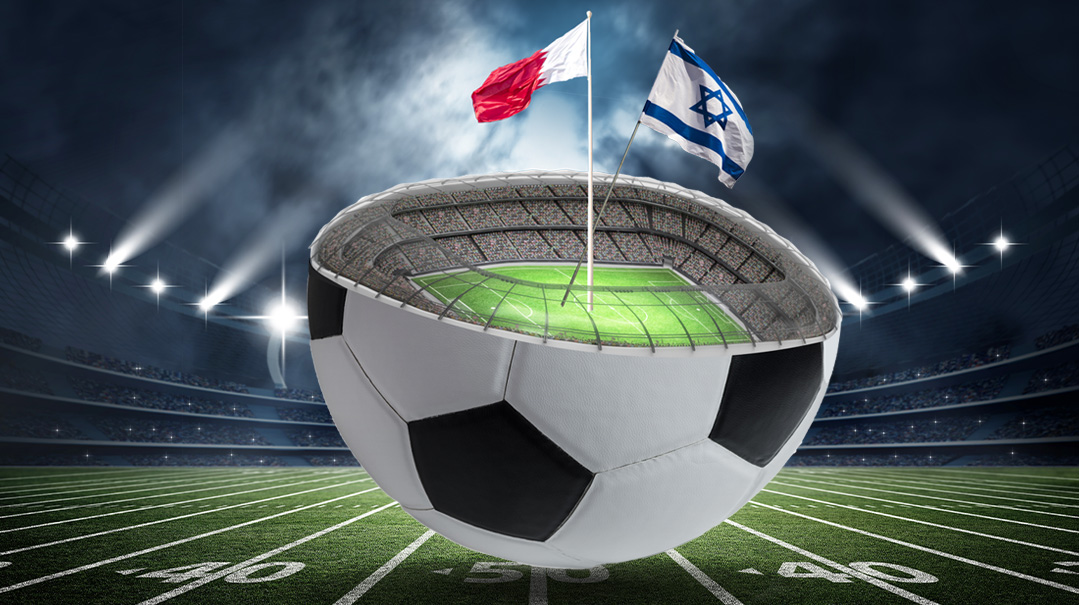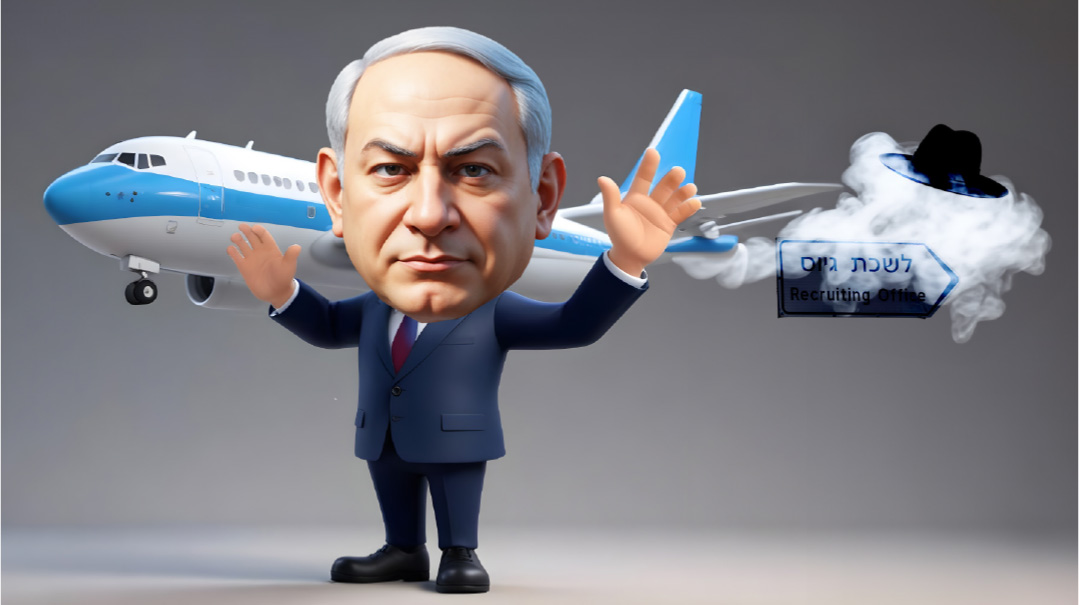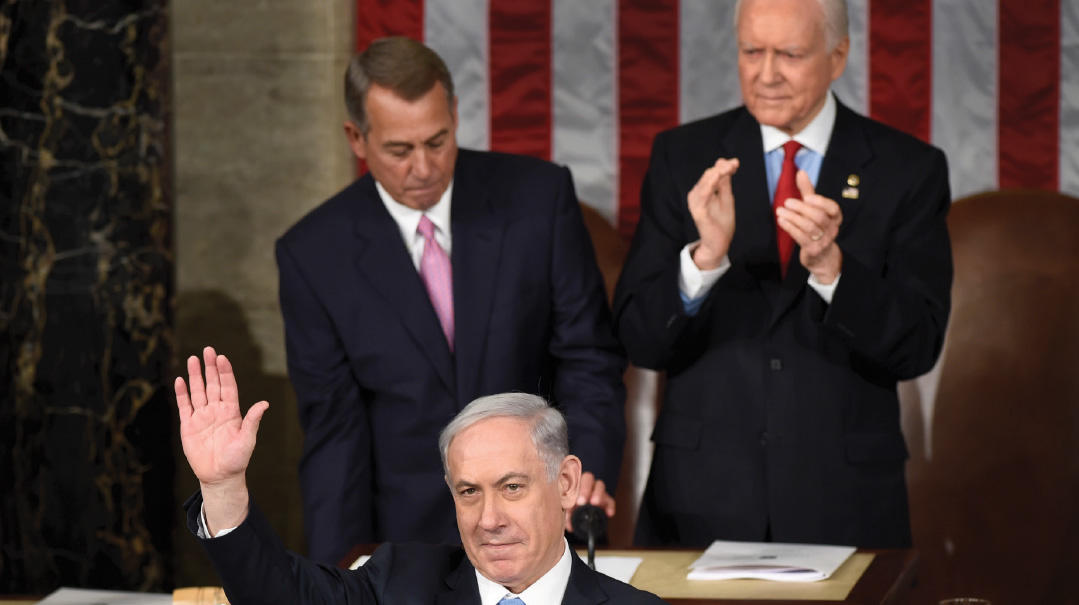Political Football

Can 22 men chasing a ball advance the cause of Mideast peace?

Unlike the recently concluded “World Series” in the US, the World Cup soccer tournament that started this past Sunday in the Gulf Arab state of Qatar, is a truly global competition, contested by 32 national teams and watched by some five billion people.
Although most eyeballs will be fixed on the actual games, when the world’s attention is turned to a stage this large, it is inevitable that geopolitical considerations will come into play. In a long tradition of sports diplomacy, the Qataris are using sport as a huge smokescreen to cover what is happening behind the scenes: billions of dollars are spent on disputes, political agreements, strategic calculations, and even military decisions.
The powerful emirate of Qatar, a tiny geographical entity whose economic power is inversely proportional to its territory, has spent lavishly on this extravaganza. According to Qatar’s finance ministry, more than $220 billion has been invested in infrastructure for the tournament. That is 15 times more than what was invested by the hosts of the last World Cup, Russia, in 2018.
The Qataris do not possess a rich soccer tradition. If they did, it might have helped distract attention from some really serious issues. This Arab country has little or no respect for individual freedoms; physical punishments are still meted out for various misdemeanors (for example, 40 to 100 lashes for drinking alcohol in certain areas); and many construction workers building the lavish facilities are toiling under conditions of semi-servitude. In fact, according to a report by London’s The Guardian newspaper, more than 6,500 builders have died working in the oppressive desert heat so the Qatari government could dazzle the world with its futuristic stadiums.
It is evident that the emirate’s petro-billions have enabled them to sponsor this event and that they intend to leverage it for many uses beyond sports. Qatar would then join a long list of nations that have hosted world tournaments to score political points.

Israelis are on the ground, but peace is probably not round the corner
Sports Diplomacy
The proof that sport can extract more concessions than politics was confirmed when Qatar allowed direct flights from Tel Aviv for the World Cup. The Qataris have no diplomatic relations with Israel, and the Hamas terror faction is widely believed to be partly funded by sources in the emirate. However, none of that seemed to matter to FIFA, world soccer’s governing body, which organizes the quadrennial World Cup and lobbied Qatar to allow Israeli fans to fly to the event.
All of this sports diplomacy has a famous precursor: the “ping-pong diplomacy” involving the United States and the People’s Republic of China in the 1970s, with truly earthshaking results.
In 1971, the World Table Tennis Championship would take place in Japan. No offense to ping-pong fans, but this was a rather low-key affair. However, the international intrigue playing out behind the scenes was quite different: The United States was looking for diplomatic allies to find a way to end the conflict in Vietnam and the Chinese Communist government needed allies to end the military incursion on its border with the Soviet Union.
The United States needed the Chinese, and China needed the Americans. The problem was that the nations had severed diplomatic relations in the 1950s after fighting in the Korean War.
While playing in Japan, the US table tennis team received a “surprising” invitation to visit China. They did so, ostensibly only in the interest of advancing the sport. However, that seemingly insignificant move sparked international relations: Two months later, the United States lifted its trade embargo against China, and less than a year later, President Richard Nixon would make his historic visit to Beijing, then ruled by Chariman Mao Zedong.
But although that sports diplomacy led to history-making changes, observers hoping for a Middle East breakthrough from Israeli soccer fans flying to Qatar should set only modest goals. Not everything will be rosy for Jews who decide to visit Qatar. Israel’s foreign minister warned its citizens to keep a low profile, not only because it is a country whose official religion is Islam, and where sharia law rules, but because there will be many competitors from other countries at odds with Israel.
The most prominent in this regard is Iran, from which tens of thousands of fans are expected to come to cheer on their national team. The Israeli government asked that its citizens not use symbols that could identify them as Jews (Magen Davids or Israeli flags), and that they conform to the rules, such as no alcohol in the stadiums.
Sportswashing
Qatar’s role as World Cup host has drawn a lot of international attention and outcry for its repressive policies, and the emirate is clearly hoping the sporting spectacle will help redeem its image around the globe. Qatar is far from the first country hoping to use sports this way.
Clouds were already gathering in Europe in the early 1930s as tyrannical figures took control in several countries. Those regimes quickly grasped the propaganda value of hosting a major international sports tournament. In 1934 Benito Mussolini’s fascist Italy hosted the World Cup, and two years later, his ally Adolf Hitler held the Olympics in Berlin. Both leaders used the competitions to “sell” the images of their countries as powerful and advanced. Although there were campaigns calling for boycotts of the competitions, they all failed.
Closer to our time, it is impossible to forget that Vladimir Putin’s Russia in the 2010s played the same game. All those rending their garments today at his invasion of Ukraine chose to ignore the Russian leader’s authoritarian signals when he hosted not only the 2014 Winter Olympics, but also the 2018 World Cup. Putin showed himself to be a tough statesman who knew how to carry out his plans. And all the countries who participated in those contests helped buy into that image.
The most recent case concerns the LIV Golf League, funded entirely by Saudi Arabian money. The Saudis opened their checkbooks to lure top-level golfers to their championship, something that has not gone down well with the PGA Tour, the organization that traditionally runs professional golf. The LIV Golf tour’s chief executive officer, former golfer Greg Norman, insists this has nothing to do with whitewashing the Gulf kingdom’s image, but only showcases the love Saudi sheikhs have for the sport.
When he was asked about Prince Mohammed Bin Salman’s links to regime critic Jamal Khashoggi’s murder, Norman made a strange statement that raised a few eyebrows: “Look, we’ve all made mistakes, and you just want to learn from those mistakes and how you can correct them going forward.”
The PGA has threatened to sanction golfers who compete in that tour. But at this point, you don’t have to be a cynic to wonder if they’re concerned more about their own corporate image than they are about human rights.
Who Gets a Red Card?
The politicization of sport naturally leads to questions about the competitors themselves. Are professional athletes implicated in the crimes of the despots in whose tournaments they compete? Is it possible to isolate the sport competition from all the political noise surrounding it? What sort of moral responsibilities to these athletes bear?
From the 1950s until the late ’80s, many sports organizations cut ties with South Africa due to its apartheid regime. The most shocking political decision came when the International Olympic Committee expelled the country in 1970. That decision would then be replicated by the International Tennis Federation and FIFA. It would be ridiculous to assume that all South African athletes agreed with their government’s decisions, but these moves were made in the geopolitical arena, and they couldn’t do much about it.
Something similar happened more recently with Russian competitors, after the invasion of Ukraine. In addition to the economic and commercial sanctions applied to the Putin regime, many athletes were affected by decisions of international sporting committees. Given that sport was a major propaganda focus for Putin’s government, the athletic boycotts were intended to exert pressure on Moscow’s political decisions.
But the moral yardsticks applied by these international athletic federations are rather questionable, or, at best, unpredictable. As much as these groups champion the causes of freedom or equality, they have no problem allowing countries like Iran, where police are massacring hundreds (possibly thousands) of civilians, to compete in different tournaments, or China, despite constant complaints of human rights violations against its Uighur population.
As of now, the outcome of the protests against Qatar is uncertain. Several performing artists have decided to cancel their appearances to show their opposition to the emirate’s policies. But, on the other hand, leading countries of the so-called “free world,” such as the United States, Denmark, and England, are participating in the event. Some organizations have asked athletes to wear armbands in protest in Qatar. But that again begs the question: Why are athletes responsible for what happens on the geopolitical level?
Meanwhile, the ball keeps turning, and so does business. Western posturing apart, the Qataris are probably right in thinking that their gigantic exercise in sportswashing will pay off.
That’s why they have no intention on the tactic. In 2023, the Asian Football Cup will be played. The host? You guessed it: Qatar.
(Originally featured in Mishpacha, Issue 937)
Oops! We could not locate your form.







